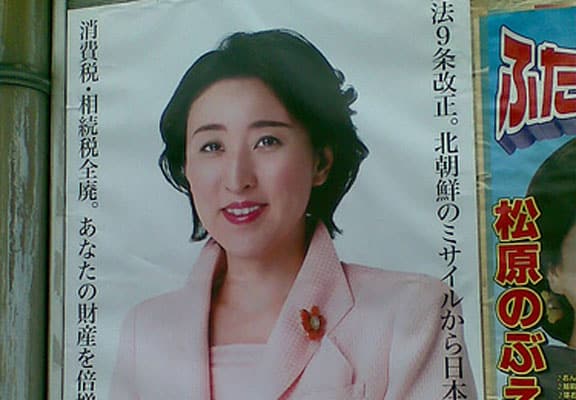

Credit: Flickr Username: spr6685
Photo License: Attribution-NonCommercial 2.0 Generic (CC BY-NC 2.0)
URL: http://bit.ly/1aF5STS
TOKYO, Japan (WOMENSENEWS)–Japanese politics is still an Old Boy’s club, according to Kuniko Tanioka.
She should know.
Tanioka has been a member of the country’s Diet, or national legislature since 2007, in addition to being president of Japan‘s Shigakkan University at Obu City in Aichi prefecture.
“If you visit the Diet and you are a newcomer, you will have a hard time finding a women’s washroom, “she said in a recent interview in Tokyo. “That’s because the building was built when women didn’t even have the vote and there were no women in the building. Women’s facilities were slowly introduced as women were starting to be incorporated in this ‘village,’ though men didn’t like the idea of female Diet members. They wanted to hold on to their positions and prestige.”
As a sign of the Diet‘s male bias, Tanioka points to the high number of politicians’ sons among the 148 relatives holding seats in the 480-member lower Diet.
“If you want to talk about male chauvinists, just see the way these male politicians look to their sons, and not their daughters,” Tanioka said.
While an occasional daughter or granddaughter does hold a seat in the Diet, she said that is more the exception than the rule.
“We [in politics] are a reflection of the entire Japanese society in its entirety,” Tanioka said. “The only way to change this is if women become aware of the situation. That is what will open the doors.”
A women’s group, the non-partisan All-Japan Obachan Party, has been working for over a year to do just that.
Its focus is not to elect or support particular politicians. Instead members are pushing for more female representatives in government and in the Cabinet to raise women’s political awareness and involvement, improve women’s work opportunities, and ensure equal pay and adequate levels of childcare for those wanting to work outside the home.
Offering a Closed Forum
In addition to holding regular press conferences on these issues, the group offers a closed forum where women can gather and openly talk about political and other issues.
Obachan is a familiar and friendly term for an older woman, roughly equivalent to “auntie.” The group’s motto is: “AJOP is Love and Courage, and Obachan will save the world.”
It began on Sept. 15, 2012, when its leader, Mayumi Taniguchi, an associate professor at Osaka International University, posted a Facebook comment about the problems faced by women. “I’m tired of (old men) politics. Shall we launch an old women’s party?” she wrote.
A throng of women responded to Taniguchi’s battle cry.
Today, the non-partisan AJOP represents women from about 20 to 70 years old and says its membership of more than 3,000 is rising.
The group aims to change the role of women in both politics and everyday life.
While Japan‘s Prime Minister Shinzo Abe says he wants to boost women’s public stature, the AJOP points to a mere two women in his 24-member cabinet.
Parties Made Up of Men
“Both parties are almost all made up of men, wearing dark gray suits and discussing sensitive diplomatic problems concerning the Senkaku Islands or changing the constitution of Japan, without taking women’s opinions into account,” said party member Tomoko Satome, an obstetrician and deputy department leader at Kanagawa Prefectural Shimoidai Hospital, at a press conference in Tokyo in March.
“We are a very gender-biased society, and the bias is created by a male-dominant society. Our situation is the same as the 1960s when I was born, so we must act to change it, from the bottom up, and make the changes from the top to bottom.”
AJOP‘s “basic strategic policy” events–which have been attracting national and international coverage– are designed to spur women to discuss politics and make connections between politics and their own lives.
AJOP is planning the All World Obachan Conference in 2016.
Hiroko Inokuma, an associate professor at Tokyo City University and a vice president of AJOP, could not provide details about the plans for the event.
“I’m really surprised to see women talking about politics, speaking out and writing about it on Facebook,” Inokuma said in a phone interview. “As our activities and speaking out spreads, men can’t avoid our opinions in the future.”
AJOP members say they worry that the traditionally minded ruling Liberal Democratic Party will promote old-style cultural values where women stay quietly at home, and men work.
Japan is still one of the lowest-ranked Asian nations when it comes to the number of female legislators. The percentage of women in national parliaments worldwide has reached 20.3 percent, marking the first time the proportion of women in parliaments exceeded 20 percent globally, according to a March report by the Inter-Parliamentary Union. Japan, with a rate of female representatives at about 8 percent in the lower house and 18.6 percent in the upper house ranks 123 among 189 countries surveyed.
Catherine Makino has written for an array of publications, including the San Francisco Chronicle, Los Angeles Times, Inter Press Service, Voice of America Radio, Manchester TV, Asia Times, American Chamber of Commerce and Asian Wall Street Journal. She was president of the Foreign Correspondents’ Club of Japan 2008-2009.
Would you like to Comment but not sure how? Visit our help page at https://womensenews.org/help-making-comments-womens-enews-stories.
Would you like to Send Along a Link of This Story? https://womensenews.org/story/the-world/130922/japanese-aunties-party-presses-gender-parity

